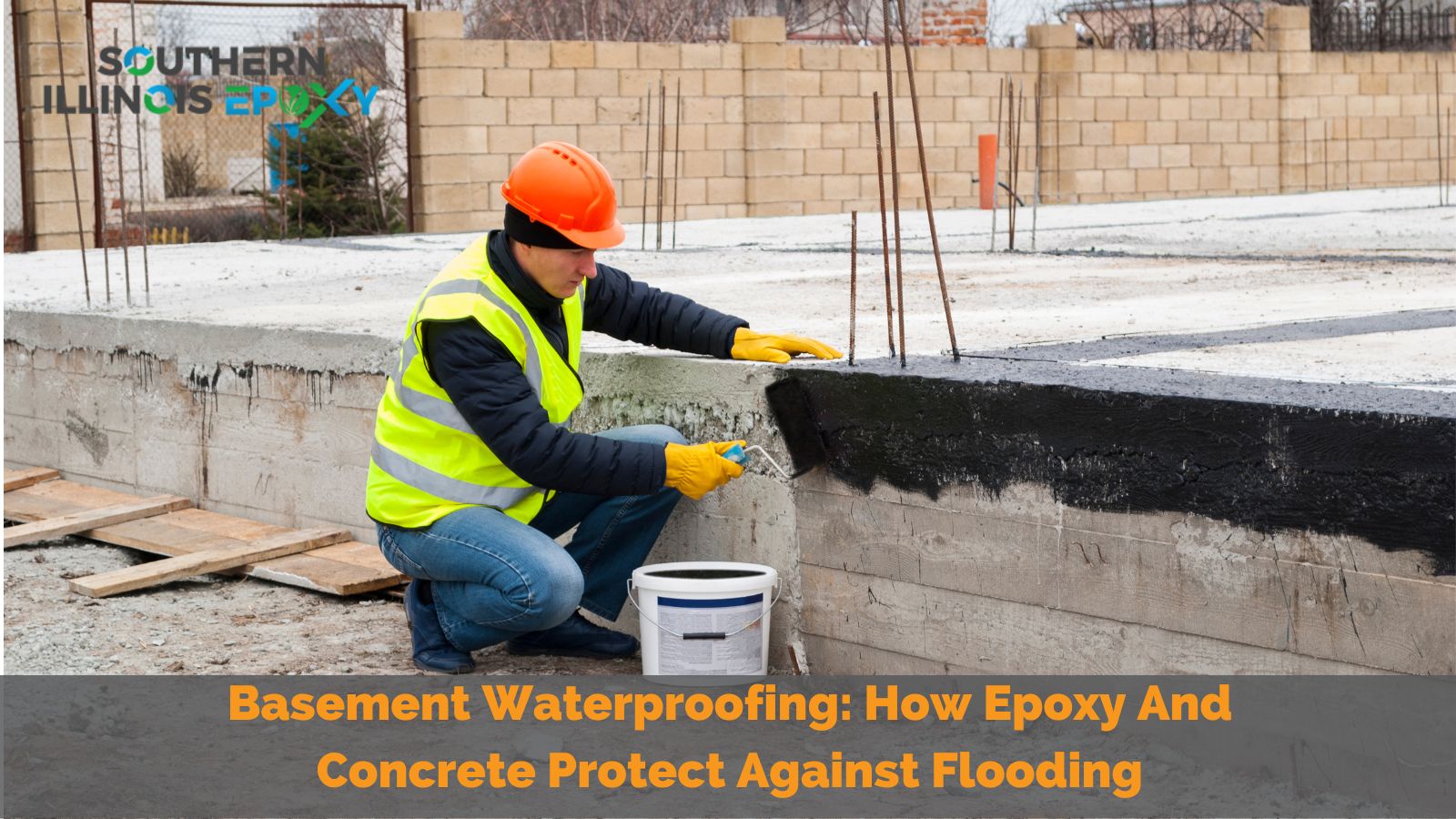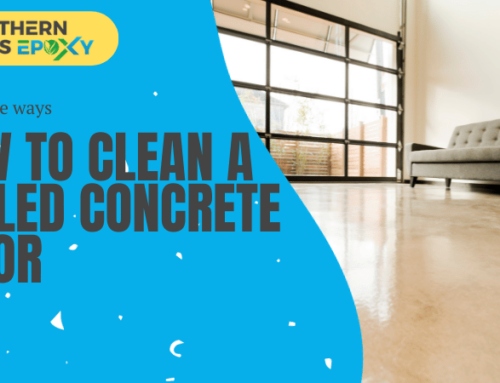A dry and secure basement is the cornerstone of a resilient home. It’s the first line of defense against water intrusion, which can lead to costly damage, mold growth, and health concerns. Builders use several techniques to keep houses secure, and one of them is epoxy flooring.
Epoxy and concrete, when properly installed, have a seamless and impervious surface that is resistant to moisture and mold buildup. They leave no cracks and, hence, prevent water or flood from penetrating the house. Also, they are easy to clean, making them an excellent option for basement waterproofing.
So, if you’re curious about safeguarding your basement against flooding while adding durability and aesthetic appeal, read on and unlock the full potential of epoxy and concrete in the world of basement waterproofing.
Why Is Basement Waterproofing Important?
Basement waterproofing is an important aspect of maintaining the structural integrity and overall health of a home. It involves implementing various techniques and materials to prevent water from seeping into the basement, which can lead to a multitude of problems if left unaddressed.
Here’s why basement waterproofing is so important:
- Prevents Structural Damage: The most immediate concern is that water intrusion can weaken the foundation of your home. Over time, moisture can cause cracks in the walls and floor, leading to structural instability. Waterproofing safeguards against these issues, ensuring your home remains structurally sound.
- Mold and Mildew Prevention: A damp basement is a breeding ground for mold and mildew. These fungi not only damage your property but also pose significant health risks to you and your family. Waterproofing helps maintain a dry and healthy living environment.
- Improved Air Quality: A waterproofed basement reduces humidity levels in your home. High humidity can lead to poor indoor air quality and exacerbate respiratory problems. By controlling moisture, waterproofing contributes to better air quality.
- Protects Belongings: Many homeowners use their basements for storage. Waterproofing safeguards your valuable belongings from water damage, ensuring that sentimental items, furniture, and other possessions remain intact and functional.
- Energy Efficiency: Moisture in the basement can lead to temperature fluctuations, making your HVAC system work harder to maintain a comfortable indoor climate. Waterproofing helps regulate temperature, potentially lowering energy bills.
- Increased Property Value: A waterproofed basement is an attractive feature for potential buyers. It adds value to your property and makes it more marketable if you ever decide to sell.
- Peace of Mind: Knowing that your basement is protected against water intrusion provides peace of mind. You won’t have to worry about sudden leaks or flooding during heavy rain, allowing you to enjoy your home with confidence.
What Is The Best Method Of Waterproofing A Basement?
The best method of waterproofing a basement often involves a combination of approaches tailored to the specific needs of your basement and local conditions. Exterior waterproofing, such as excavating and applying waterproof membranes, is highly effective but can be costly and disruptive.
Consulting with a professional waterproofing contractor is crucial to assess your situation, recommend the most appropriate methods, and ensure proper installation for optimal basement waterproofing.
Here are some of the most effective and commonly used methods for basement waterproofing, each with its advantages and considerations.
1. Exterior Waterproofing
Excavation and Membrane Installation: This involves excavating around the foundation to apply a waterproof membrane or coating on the exterior walls. It is highly effective but can be expensive and disruptive.
2. Interior Waterproofing
Interior Drainage System: Installing an interior drainage system, such as a French drain or a sump pump, can effectively divert and manage water that enters the basement. It’s a cost-effective method and can be less invasive than exterior options.
Interior Sealants and Coatings: Applying waterproof sealants and coatings to interior basement walls can help prevent moisture penetration. While it’s not as comprehensive as other methods, it can be a budget-friendly option for minor moisture issues.
3. Crawl Space Encapsulation
If your home has a crawl space, encapsulating it with a vapor barrier, insulation, and a dehumidifier can prevent moisture and mold problems from affecting your basement.
4. Exterior Grading
Properly grading the landscape around your home away from the foundation can help prevent water from flowing toward the basement walls in the first place. It’s a preventative measure often combined with other methods.
5. Window Well Installation
If your basement has windows, installing window wells with proper drainage can prevent water from seeping in through these openings.
6. Foundation Crack Repair
Identifying and repairing any cracks in the foundation is crucial to preventing water intrusion. Epoxy injections or hydraulic cement can be used to seal these openings.
7. Waterproofing Membranes
Interior waterproofing membranes (like dimpled plastic sheets or waterproof wall panels, can be installed to manage water and direct it toward a drainage system).
8. Hybrid Approaches
In some cases, a combination of these methods may be necessary for optimal waterproofing, especially if your basement has unique challenges.
How Epoxy And Concrete Protect Against Flooding
The basement is one part of the house most owners neglect and is usually damp with mold and mildew buildup. The essence of basement waterproofing is to prevent water from penetrating a basement so it stays dry and damp-free. Epoxy and concrete are viable options for basement waterproofing because of their unique properties.
1. Epoxy
Epoxy flooring is a fantastic option for protecting against flooding in various environments, including basements, garages, and industrial spaces. It not only provides practical flood protection but also enhances the overall functionality and aesthetics of the area.
Here’s why epoxy flooring is suitable for basement waterproofing:
- Seamless Surface: Epoxy flooring creates a seamless and impervious surface when properly installed. This seamless surface prevents water from infiltrating cracks and joints in traditional flooring materials, which are common entry points for water during flooding.
- Resistance to Mold and Mildew: Epoxy’s inhospitable environment for mold and mildew growth makes it a favorable choice for basement waterproofing. It does not provide the organic materials or moisture necessary for these microorganisms to thrive.
- Chemical Resistance: Epoxy coatings are highly resistant to a wide range of chemicals and liquids, including water. This resistance makes epoxy flooring an ideal choice for areas prone to flooding, as it can withstand the corrosive effects of floodwaters and any contaminants they may carry.
- Quick and Easy Cleanup: When flooding occurs, cleaning up and restoring the affected area is crucial. Epoxy flooring simplifies this process significantly. Since it is non-porous, floodwater, mud, and debris can be easily and quickly removed with minimal effort.
- Durable and Long-Lasting: Epoxy flooring is exceptionally durable and long-lasting. It can withstand the wear and tear associated with flooding, including foot traffic, heavy objects, and equipment movement. This durability ensures that the flooring remains effective in protecting against future floods.
- Moisture Barrier: Epoxy creates a moisture barrier that prevents water from penetrating the substrate, thus safeguarding the underlying concrete or floor structure from water damage, erosion, and mold growth.
- Slip Resistance: Many epoxy coatings can be customized with slip-resistant additives, enhancing safety during and after flooding events. This slip resistance minimizes the risk of accidents and injuries on wet surfaces.
- Aesthetic Appeal: Epoxy flooring is not only functional but also visually appealing. This can be particularly beneficial in spaces like basements or garages, as it transforms a dull area into an attractive and functional space.
- Preventative Maintenance: Routine maintenance and resealing of epoxy flooring can extend its lifespan and maintain its flood protection properties, ensuring long-term flood resilience.
2. Concrete
When properly poured and cured, concrete forms a dense, impermeable surface that naturally resists water penetration. This seamless and solid foundation minimizes the risk of water infiltration through cracks or seams, common entry points for moisture in other flooring materials.
Here’s why concrete flooring is good for basement waterproofing.
- Inherent Waterproofness: Concrete is naturally resistant to water penetration. When poured and cured correctly, it forms a dense and impermeable surface that minimizes the risk of water seepage through the floor.
- Seamless Surface: Concrete floors are typically poured as a single, seamless slab. This eliminates joints and seams that are common entry points for water in other types of flooring, reducing the chances of water infiltration.
- Elevated Installation: In flood-prone areas, concrete floors can be installed at a slightly elevated level compared to the surrounding terrain. This incline encourages water to flow away from the structure rather than toward it, helping to prevent water entry.
- Quick and Easy Cleanup: In the event of flooding, cleaning and restoring a concrete floor is relatively straightforward. Concrete is non-porous, making it easy to remove floodwater, mud, and debris. It can be hosed down, scrubbed, and dried quickly.
- Durability: Concrete is a robust and long-lasting flooring material. It can withstand the physical stresses and pressures associated with flooding, such as the weight of floodwater and debris, without sustaining significant damage.
- Moisture Barrier: Properly sealed concrete forms an effective moisture barrier, protecting the underlying substrate from water damage, erosion, and mold growth.
- Resistance to Mold and Mildew: Concrete’s inhospitable environment for mold and mildew growth makes it a favorable choice for flood-prone areas. It doesn’t provide the organic materials or moisture needed for these microorganisms to thrive.
- Versatility: Concrete floors can be customized with various finishes, such as epoxy coatings or sealants, to enhance their resistance to water and provide a more aesthetically pleasing appearance.
- Structural Integrity: Unlike some flooring materials that can weaken when exposed to moisture, concrete maintains its structural integrity even when submerged in water for extended periods.
- Low Maintenance: Once installed, concrete flooring requires minimal maintenance to retain its flood protection capabilities, reducing long-term costs.
Speak With an Epoxy Flooring Expert at Southern Illinois Epoxy
Whether it’s the seamless and impermeable shield of epoxy or the inherent durability of concrete, these flooring options offer more than just flood protection; they deliver the promise of a fortified and functional living space.
With the right techniques and materials, Southern Illinois Epoxy can transform your basement into a resilient fortress capable of withstanding the challenges of water intrusion while enhancing the aesthetics and value of your home. Trust our team to deliver the best quality for your home. Reach out to us if you have any flooring needs or questions.




